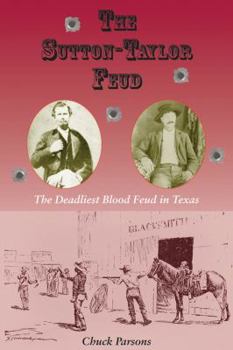The Sutton-Taylor Feud, 7: The Deadliest Blood Feud in Texas
Select Format
Select Condition 
Book Overview
The Sutton-Taylor Feud of DeWitt, Gonzales, Karnes, and surrounding counties began shortly after the Civil War ended. The blood feud continued into the 1890s when the final court case was settled with a governmental pardon. Of all the Texas feuds, the one between the Sutton and Taylor forces lasted longer and covered more ground than any other. William E. Sutton was the only Sutton involved, but he had many friends to wage warfare against the large Taylor family. The causes are still shrouded in mystery and legend, as both sides argued they were just and right. In April 1868 Charles Taylor and James Sharp were shot down in Bastrop County, alleged horse thieves attempting to escape. During this period many men were killed "while attempting to escape." The killing on Christmas Eve 1868 of Buck Taylor and Dick Chisholm was perhaps the final spark that turned hard feelings into fighting with bullets and knives. William Sutton was involved in both killings. "Who sheds a Taylor's blood, by a Taylor's hand must fall" became a fact of life in South Texas. Violent acts between the two groups now followed. The military reacted against the killing of two of their soldiers in Mason County by Taylors. The State Police committed acts that were not condoned by their superiors in Austin. Mobs formed in Comanche County in retaliation for John Wesley Hardin's killing of a Brown County deputy sheriff. One mob "liberated" three prisoners from the DeWitt County jail, thoughtfully hanging them close to the cemetery for the convenience of their relatives. An ambush party killed James Cox, slashing his throat from ear to ear--as if the buckshot in him was not sufficient. A doctor and his son were called from their home and brutally shot down. Texas Rangers attempted to quell the violence, but when they were called away, the killing began again. In this definitive study of the Sutton-Taylor Feud, Chuck Parsons demonstrates that the violence between the two sides was in the tradition of the family blood feud, similar to so many other nineteenth-century American feuds. His study is well augmented with numerous illustrations and appendices detailing the feudists, their attempts at treaties, and their victims.
Format:Paperback
Language:English
ISBN:1574415344
ISBN13:9781574415346
Release Date:June 2013
Publisher:University of North Texas Press
Length:400 Pages
Weight:1.25 lbs.
Dimensions:1.0" x 6.0" x 9.0"
Customer Reviews
2 ratings
the sutton-taylor feud
Published by Thriftbooks.com User , 15 years ago
As a reader who was born and raised in Texas, the history of one of the state's bloodist era's was particulary interesting. Though some of the characters were rather thinly described, there is enough substance to garner history buff's attention and provide an enjoyable and entertaining read.
A fascinating, expertly researched chronicle of bloodshed on American soil long after the Civil War
Published by Thriftbooks.com User , 16 years ago
Highly accessible to lay readers and scholars alike, The Sutton-Taylor Feud: The Deadliest Blood Feud in Texas is the shocking true story of a murderous blood feud that continued into the 1890s when the final court case was settled with a governmental pardon. Of all Texas feuds, the one between the William E. Sutton (and his many friends) and the Taylors lasted longer than any other. The initial cause of the feud is lost to history, though both sides are known for insisting that they were on the side of righteousness. The violence and bloodshed included preemptive executions by lynch mobs, the slaying of two military soldiers, and the lethal shooting of a doctor and his son. Pressures and family ties through marriage or friendship forced many a Texan to take sides - those who wouldn't often felt even more endangered and better off moving to another state. A fascinating, expertly researched chronicle of bloodshed on American soil long after the Civil War, The Sutton-Taylor Feud is an a worthy addition to college library and Texas history shelves.





